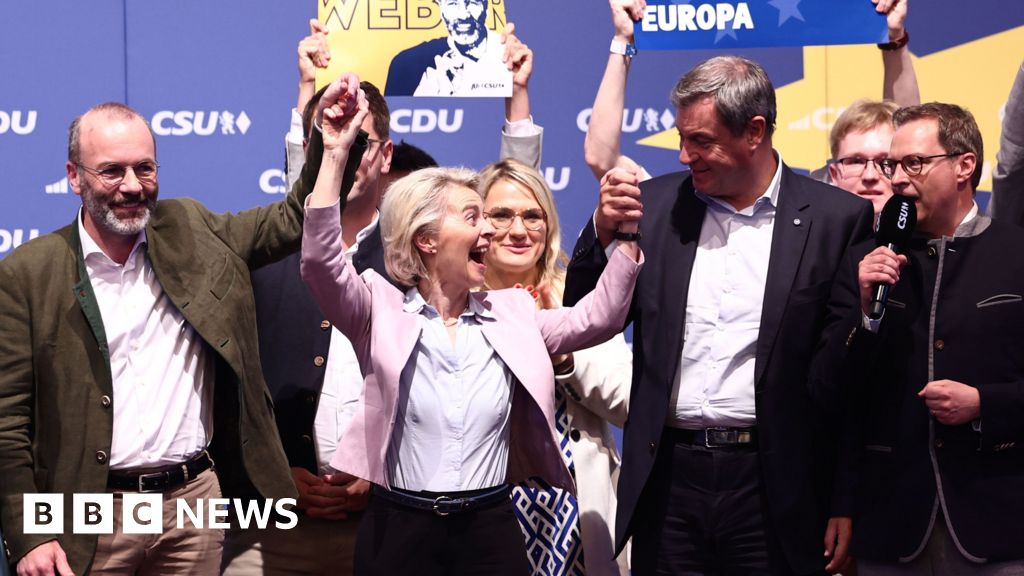By Paul Kirby and Laura Gozzi, BBC News in Brussels and Rome
 EPA
EPAExit polls had begun to roll in at the end of European elections across the EU’s 27 countries, when President Emmanuel Macron delivered his bombshell moment in a televised address to a stunned French population.
“I’ve decided to hand you back the choice of our parliamentary future with a vote. I am therefore dissolving the National Assembly,” he declared.
The National Rally party – led by Mr Macron’s rivals Marine Le Pen and Jordan Bardella – was one of the big gains that Europe’s far-right parties had expected, and confirmation came with all the exit polls giving the party more than 30%, double that of Mr Macron’s centrist Renaissance.
But beyond France, the broader story of Europe’s four-day vote marathon really belonged to the parties of the centre right.
They tightened their grip on the European Parliament, with victories in Germany and Spain, and significant advances in Hungary, against long-dominant Prime Minister Viktor Orban.
The far right did not enjoy as great a surge across Europe as many had predicted.
In the Netherlands, Geert Wilders’ Freedom Party came second, while Austria’s party of the same name came out as winners, but only narrowly.
“The centre is holding, but it is also true that the extremes on the left and on the right have gained support,” said Ursula von der Leyen, the centre-right head of the European Commission.
“And this is why the result comes with great responsibility for the parties in the centre.”
There had been talk before the vote that her dominant European People’s Party might consider talking to the two right-wing groups that house the far right.
But she made clear her only allies would be the Socialists & Democrats and the liberal Renew group that includes Mr Macron’s party.
Germany’s opposition conservatives were always going to come out on top, and they scored an impressive 30% of the vote.
But for Chancellor Olaf Scholz’s SPD party this was the worst ever result in a European election, coming third behind the far-right Alternative for Germany (AfD).
The AfD has endured a slew of scandals involving espionage, foreign interference and allegations of Nazi sympathies, and yet its support still held up.
“After all the prophecies of doom, after the barrage of the last few weeks, we are the second strongest force. And I’m telling you, the only way is up,” said co-leader Alice Weidel.
 EPA
EPAMeanwhile a new anti-migrant far-left party, BSW, led by charismatic left-wing firebrand Sahra Wagenknecht, also performed well – rounding off a good night for radical parties.
In Spain, the centre-right opposition Popular Party (PP) defeated Prime Minister Pedro Sánchez’s Socialists, but not by the big margin that PP leader Alberto Núñez Feijóo had been hoping for.
Another far-right party, Vox, came a distant third.
Meanwhile, in Italy, Giorgia Meloni’s dominance of the country’s politics continues.
Her far-right Brothers of Italy defeated the centre left Democratic Party of Elly Schlein by less than four points.
“Thank you to the Italians who are continuing to choose us… I am proud of the result tonight,” she told her supporters.
 Reuters
ReutersIn just five years, Ms Meloni has more than doubled her party’s seats in the European Parliament, while Ms Schlein’s performance pleasantly surprised even party activists.
There was no far-right success story in Belgium’s national elections, even though Flemish separatist party Vlaams Belang was widely expected to win.
The Flemish National Alliance is now the dominant party there, bringing an end to the rule of liberal Prime Minister Alexander De Croo.
“The far right has underperformed in Belgium, the Czech Republic, Hungary, Finland and Poland. But it has overperformed in France,” said Prof Alberto Alemanno of HEC Paris, who was surprised that President Macron decided to dissolve parliament.
“It’s disproportionate that these election results might push a government out of a country,” he told the BBC.


